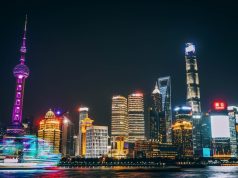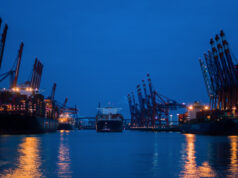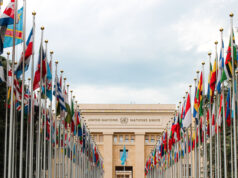INSIGHT by Andrew White, Sustainable Investment Consultant
| The outcome of the US election will have ramifications for the ESG landscape across the globe, not least because it affects the future relationship of the world’s two superpowers, China and the US; that relationship in turn having a big impact on international agreements relating to equitable trade and climate change. At time of writing the race to the White House remains undecided and will come down to results in the remaining battleground states which have not yet declared. But with Michigan and potentially Wisconsin being narrowly won by Joe Biden, and with every indication he will win in Arizona and Nevada – as we await counting of the postal ballots which tend to favour the Democratic candidate – Biden’s path to the Oval Office seems the easier one. Whereas a Trump victory would see an emboldening of the hard stance on trade and the environment, a Biden win may still see a tough position towards China, but an agenda more supportive of the environment, notably on climate.
Good environmental, social and governance (ESG) standards are important not just for corporates and investors, but for government leaders and local community administrators alike. In responsible investor circles, ESG issues are seen as being of material financial consequence and vital for the health of people and planet. Over the past thirty years, a raft of reports has attempted to make the business case for ESG integration into investment decisions, usually successfully so. Yet despite 2020 being something of an apocalyptic year, powerful sceptics, among them the leaders of China and the US – whose decisions have the potential to affect the health of citizens, the environment, and therefore global stock markets – have still acted in ways which sometimes suggest they do not make the link between environmental, social and governance risk and financial impacts.
Even as forest fires raged across Australia and North America (where they continue to burn, most likely due to our changing climate) the US government has been steadfast in its denial of the climate emergency and on June 1, 2017, President Trump announced that the US would cease all participation in the 2015 Paris Agreement on climate change. The American presidential election was fought along Covid lines, with Biden opting for a rules-based, good governance approach to mask wearing and social distancing, and Trump seemingly advocating the opposite. And following the SARS virus in 2003, the Chinese government was criticised for responding slowly to that outbreak and of concealing the seriousness of the illness. Standards of hygiene and animal welfare at food markets have improved it is said, but not enough and are not universal across Asia. It does appear that ESG standards applied by local governments in the region were not sufficient to prevent another, far more deadly corona virus spreading across the world.
Despite some doubt about the precise origins of the corona virus, most likely it can be traced back to wet markets in Asia and more specifically China, but also to the illegal trade in exotic wildlife species. Animals in wet markets are penned or kept in miniscule cages unable to move, and slaughtered or sold live next to stalls selling fruit and vegetables. Places where domestic livestock, foxes, badgers and exotic animals excrete bodily fluids and are killed inhumanely next to fresh food do not sound like a good combination in the promotion of health and safety principles. They are an obvious breeding ground for the virulent novel diseases that cross the species barrier to humans and occasionally become pandemics.
It is hard to blame impoverished and perhaps poorly educated communities for poor animal welfare and health and safety standards, but those with more power and affluence and knowledge could do more.
And such viruses now spread at rapid rates, with environmentally damaging airplane travel accelerating the contagion level of pandemics. Local communities in developed markets too have often flouted environmental and social guidelines on how to stay healthy, by still congregating in mass gatherings. The rush by European governments to open up summer holiday travel after the first wave of the pandemic looks now to have been an exercise in poor governance and weak risk management.
As far as environmental and social risk at the regional level is concerned, scientists now say the sale of animals in wildlife markets should be strictly prohibited to minimise the risk of future outbreaks. The unusual creature that is the pangolin is likely to be next in line to be eradicated as a scapegoat for society’s inability to adopt good ESG policies, encompassing health and safety, animal welfare and exploitation. Pangolins are the most-commonly illegally trafficked mammal, used both as food and in traditional medicine. Two groups of corona viruses related to the virus behind the human pandemic have been identified in Malayan pangolins smuggled into China. Although their role as the intermediate host of the current outbreak remains to be confirmed, experts say sale of these wild animals in wet markets should be strictly prohibited to avoid future zoonotic [animal to human] transmission. And it seems only a matter of time before we have another such emergency, given that insanitary wet markets are prevalent in many other regions of the world, notably in Africa.
In addition to the obvious impacts on human health and restrictions on the way we live and work, the financial impacts of the virus are proving to be catastrophic. News channels report daily on lives lost and new cases of the virus. But on the back pages of newspapers, hard copy and electronic, there are mutterings of a financial crisis that will be worse than that of 1929. When people lose their jobs, which they are doing in their millions, they default on mortgages and cannot pay the rent. The residential and retail real estate sectors are among the hardest hit, despite some government measures such as mortgage holidays and banning evictions, which can only be short term solutions. Travel and hospitality sectors are on their knees. So much will depend on how much longer the crisis lasts and how soon economies can recover, currently no government has had an exit strategy for the either the first or more recent second lock down measures they have imposed. Their strategies focus on containment of the pandemic while the quest for a vaccine goes on.
On the other hand, since citizens are now forced to stay at home – with a quarter of the world’s population said to be in confinement – consumer buying and leisure habits have had to rapidly adjust. Online shopping and entertainment companies represent a lifeline for investors, with a positive impact for logistics firms, data centres and of course the big tech and gaming companies. Some of these sectors of the market have high environmental impacts however, being very energy hungry. The flip side is that for the commercial office sector, home working is fast becoming the norm, and it may be hard for both employers and employees to give up their new found teleworking efficiencies and lower cost structures (no expensive premises to rent, light and heat/cool). This could also intensify the need for office and residential space to be far more energy efficient in future, if big employers such as financial services companies are to make their premises more attractive than the ‘home office’.
The introduction to this short article discusses ESG in its broadest sense, and aims to show that in an inter-connected world, issues of planetary stewardship, health and well-being, communications, regulatory controls, animal welfare, crisis responses, international relations and community engagement are increasingly important. In the midst of human suffering during the pandemic, some parts of the planet have been given some breathing space from the impact of non-sustainable consumption. As countries focus on their Covid responses and limit what consumers can do and where they can go, animals and plants have had a chance to recover and even flourish in some places. It can be hoped that seeing nature recover from human impacts, will provide an inflection point and a spur to powerful countries and responsible investors, not to go back to business as usual scenarios and to embrace ESG at all levels. A second Trump term and ongoing frictions between China and the US would not help in this regard, but a Biden win, which now seems likely – albeit one which the Trump camp will contest – should see more a more positive approach to environmental and social challenges.
| brief bio
After a 20 year career managing ESG research teams and working in business development, Andy is now in a sustainable investment consulting role, working principally on portfolio management strategies and company research, supporting asset management and index provider clients in London, Amsterdam, NYC and Singapore.
Until 2016 Andy was head of sustainability research at Group La Francaise and prior to that, managing director of Innovest Strategic Value Advisors, and now part of MSCI ESG Research. In that capacity, he was instrumental in building and leading the research team and expanding the market for Innovest research in the UK and continental Europe, adding 50+ clients.
He also led several ground-breaking advisory assignments, including the first Access to Medicine Index of global pharmaceutical companies, an analytical tool for assessing companies’ performance in implementing the UN Global Compact, as well as the industry’s first sovereign risk product.
Prior to joining Innovest, he served as Managing Director at Core Ratings (a sister company to Fitch) and at PIRC, where he specialized in corporate governance, and ran a number of campaigns for the Local Authority Pension Fund Forum. He has spoken at industry events including Carbon Disclosure Project launches in London and Frankfurt and has appeared on BBCNews24, CNBCand Bloomberg TV.
| All opinions expressed are those of the author. investESG.eu is an independent and neutral platform dedicated to generating debate around ESG investing topics.









